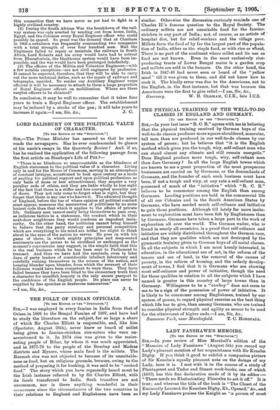[To TRE EDITOR Or THE " SPECTATOR:1
was employed in every famine in India from that of Orissa in 1866 to the Bengal Famine of 1897, and have had to study the literature on the subject, for so large a share of which Sir Charles Elliott is responsible, and, like him (Spectator, August 26th), never knew or heard of millet being given to famine-stricken rice-eaters who were un- accustomed to it. In 1874 rice was given to the maize- eating people of Bihar, by whom it was much appreciated, and in 1877-78 to the people of the Bombay and Madras districts and Mysore, whose main food is the millets. The Burmah rice was not objected to because of its unsuitable- ness as food, but on religious grounds, because, owing to the method of preparing it for husking, it was said to be "cooked food." The story which you have repeatedly heard must be the Irish instance referred to by Sir Charles Elliott, with its locale transferred to India. Such transfers are not uncommon, nor is there anything wonderful in their occurrence since the circumstances of the two countries in their relations to England and Englishmen have been so similar. Otherwise the discussion curiously reminds one of Charles Lt.'s famous question to the Royal Society. The ordinary millets are not unsuitable food for the famine- stricken in any part of India; not, of course, as an article of' hospital diet, but for relief-workers and the village poor. Millets form the food of by far the largest part of the popula- tion of India, either as the staple food, or with rice or wIreat. There is no part of the continent where millet and its use as food are not known. Even in the most exclusively rice- producing tracts of Lower Bengal maize is a garden crop and millets are sold in the bazaars. On the other hand, the Irish in 1847-48 had never seen or heard of the "yellow meal" till it was given to them, and did not know how to cook it. The kindly error was due to the Americans, not to the English, in the first instance, but that was because the Americans were the first to give relief.—I am, Sir, &c.,
Guernsey. W. B. OLDHAM, C.I.E., late I.C.S.


































 Previous page
Previous page